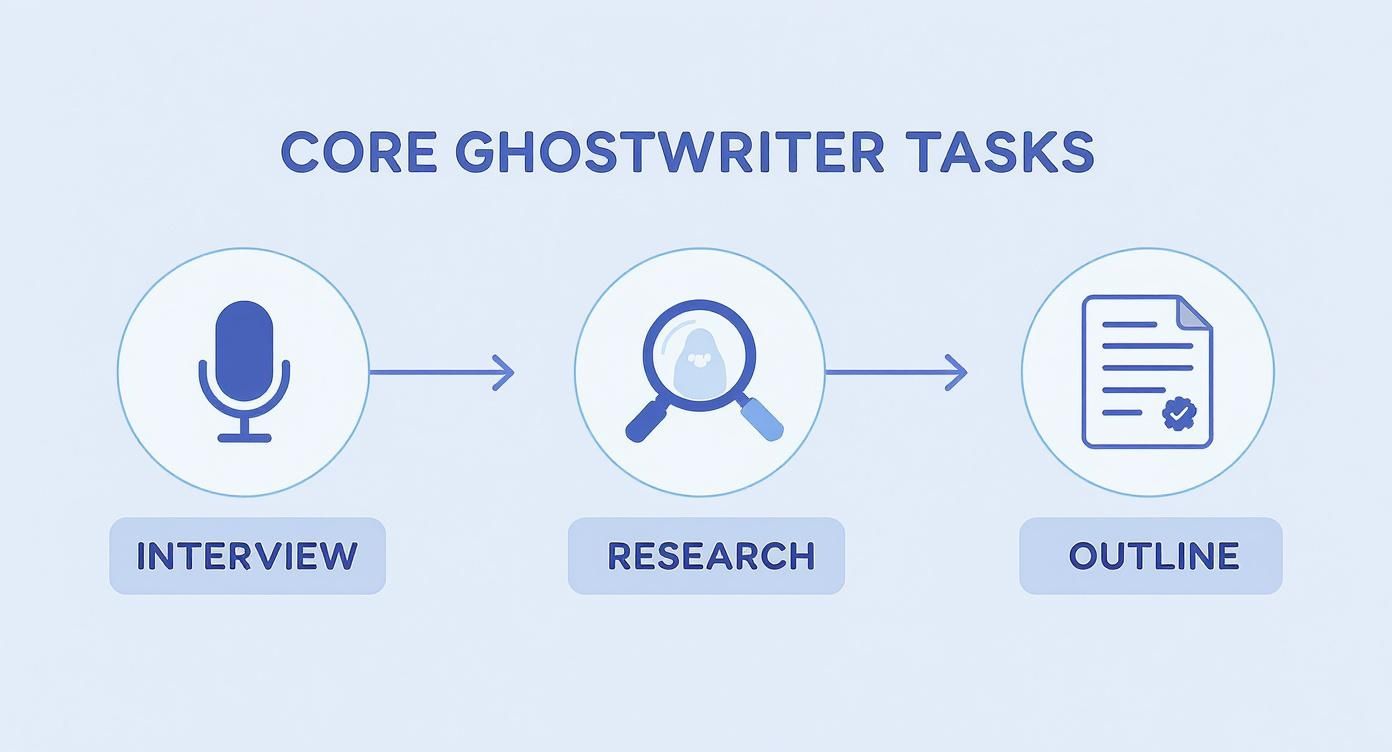Ever read a groundbreaking business book or a celebrity memoir and wondered how they found the time to write it? Chances are, they didn't. The brilliant mind behind the words might not be the person whose name is on the cover.
The Hidden Author Behind Your Favorite Books
A ghostwriter is a professional writer hired to bring someone else's story, ideas, or expertise to life on the page. In essence, their job is to translate your vision and knowledge into a polished, compelling manuscript that sounds exactly like you.

This isn't some new industry secret; it's a strategic partnership that has helped shape literature and thought leadership for centuries. Experts, executives, and public figures often have incredible knowledge to share but simply lack the time or the specific skill set to write a book.
Think of a ghostwriter as both a master storyteller and an architect for your ideas. They immerse themselves in your perspective and style, making sure the final text is completely authentic to you. They are the invisible engine that turns raw concepts into a powerful narrative.
Ghostwriting in a Nutshell: A professional writer creates content—books, articles, speeches—on behalf of a client, who is then credited as the author. This is a common and respected practice in publishing.
To give you a clearer picture, a ghostwriter does much more than just type. Their role is a blend of interviewer, researcher, strategist, and, of course, writer.
Here's a quick look at what that entails:
Key Responsibilities of a Ghostwriter at a Glance
| Responsibility | What It Involves |
|---|---|
| Voice Mimicking | Conducting in-depth interviews and studying your communication style to capture your unique tone, cadence, and personality. |
| Content Structuring | Organizing complex ideas, anecdotes, and data into a logical, engaging book outline that flows naturally from one chapter to the next. |
| Research & Fact-Checking | Filling in gaps in the material by conducting supplementary research to add depth, context, and credibility to your manuscript. |
| Narrative Crafting | Weaving your core message into a compelling story that connects with readers on an emotional and intellectual level. |
| Project Management | Keeping the project on track by managing deadlines, interview schedules, and revision cycles to ensure timely completion. |
This table shows how a ghostwriter acts as a true partner, guiding the book from a simple idea to a finished product ready for publication.
Why Is Ghostwriting So Prevalent?
The demand for high-quality, authentic content has never been higher. The global market for ghostwriting services was recently valued at USD 1.32 billion, a number that speaks volumes about its importance across nearly every industry.
Hiring a ghostwriter is a smart, practical decision. It allows leaders and experts to stay focused on their primary work while a professional manages the incredibly intensive process of writing a book.
This collaboration is a win-win, helping authors:
- Save Hundreds of Hours: Writing a book is a massive time sink. Most busy professionals simply can't clear their schedules for that kind of commitment.
- Ensure Professional Quality: An experienced writer knows how to bring structure, clarity, and storytelling flair to any subject.
- Build Authority and Credibility: A polished, insightful book is one of the fastest ways to establish yourself as a thought leader in your field.
Ultimately, the goal is to create a high-impact work that achieves your strategic objectives, whether that's growing your business, sharing your life story, or changing the conversation in your industry. By exploring professional ghostwriting services, you can see how this powerful collaboration helps bring big ideas to the world.
What a Professional Ghostwriter Really Does
It’s easy to think a ghostwriter just… writes. But the reality is so much more interesting. A truly skilled ghostwriter acts as a blend of detective, architect, and master storyteller. Their job is to dive headfirst into your world and your mind, taking all your scattered thoughts, brilliant ideas, and half-formed stories and weaving them into a manuscript that sounds exactly like you.
The whole process kicks off with the most important step of all: capturing your unique voice. This isn’t a quick chat; it involves a series of in-depth interviews. The ghostwriter’s goal is to listen—really listen—and ask the kinds of questions that get to the heart of not just what you think, but how you think. They're paying close attention to your speech patterns, your favorite phrases, and your overall perspective so the final book feels 100% authentic.
Building the Foundation: Research and Structure
Once they have a firm grasp on your voice and vision, the ghostwriter puts on their researcher hat. They immerse themselves in your topic, devouring books, articles, and industry reports to build a rock-solid foundation for your manuscript. This isn't just about sounding smart; it's about making sure your book is credible, authoritative, and packed with value.
With the research in hand, they move on to creating a detailed outline. This is the architectural blueprint for your book. A great outline organizes every chapter, argument, and story in a way that creates a powerful, logical flow. It's what separates a focused, impactful book from a collection of rambling thoughts.
To make sure every detail from their interviews is captured perfectly, many ghostwriters use smart tools. For example, finding the best interview transcription software can be a game-changer, turning hours of recorded audio into text. This lets them focus on crafting the narrative instead of getting bogged down in manual transcription.
A ghostwriter's work extends far beyond writing. Top-tier professionals are involved in shaping the narrative, conducting research, and even assisting with publishing strategy.
This comprehensive approach is why their fees can seem high. A top-tier ghostwriter, especially one with bestsellers under their belt, might charge $80,000 or more for a memoir. That fee doesn’t just cover the writing; it includes the entire editorial process, countless hours of interviews, and sometimes even help connecting with literary agents. You can discover more insights about memoir ghostwriting costs and what they include.
How Does the Ghostwriting Process Actually Work?
So, how does an idea bouncing around in your head actually become a finished book on a shelf? Working with a ghostwriter isn't about just handing off an idea and hoping for the best. It's a true partnership, a structured journey designed to pull your vision out of your mind and put it onto the page.
A seasoned ghostwriter brings a proven system to the table. Each step logically follows the last, making sure we're always on the same page and that the final book sounds exactly like you. It breaks the massive task of writing a book into smaller, much more manageable pieces.
The Foundation: Discovery and Research
Everything kicks off with what we call the Discovery phase. This is where your writer sits down with you to get crystal clear on your goals. Who is this book for? What's the one big message you want them to walk away with? Think of it like an architect drafting blueprints before a single brick is laid. Your writer needs to get inside your head to understand not just what you want to say, but why it matters.
From there, we move into Content Gathering. This is the fun part! Through a series of interviews and digging into any research, your ghostwriter starts collecting all the raw materials: your stories, your hard-won insights, the little anecdotes that bring your ideas to life. It’s a bit like a knowledge transfer, moving your expertise from you to the writer.
The infographic below gives you a nice visual of how these initial steps set the stage for building the book's structure.

As you can see, all the interviewing, research, and outlining forms the bedrock of the project long before we start writing chapters.
The Build-Out: From Blueprint to Manuscript
With all the raw material in hand, the Outlining begins. Your ghostwriter will build a detailed, chapter-by-chapter roadmap of the entire book and present it to you for approval. This is a crucial checkpoint. It lets us lock in the book’s flow and structure, making sure it’s logical and engaging before the intensive writing starts.
Next up is the Drafting phase. This is where the magic really happens. Your writer will start crafting the manuscript, usually delivering it to you in batches of chapters. This back-and-forth is key, as it lets you read and give feedback along the way, making sure the tone, voice, and style feel authentically you.
The final, critical stage is Revision. Here, we work together to polish every word, tighten every sentence, and make sure the entire manuscript is perfect.
This methodical process means there are no big, unpleasant surprises at the end. If you want to dive even deeper into the nuts and bolts, you can learn more about the complete book writing process and see how the pros turn great ideas into published books.
The Essential Skills of an Elite Ghostwriter
It’s one thing to be a great writer, but it’s another thing entirely to be a great ghostwriter. The job requires a special mix of skills that go far beyond just putting words on a page. It's a unique blend of artistry, psychology, and rock-solid business acumen.
The single most important skill is voice matching. Think of a top-tier ghostwriter as a vocal impressionist. They have an uncanny ability to listen to a client, absorb their unique way of speaking—their tone, their quirks, their worldview—and then perfectly replicate it in writing. When done right, the final book sounds exactly like the author wrote it themselves.
The Art of Connection and Discretion
Mastering someone's voice is only half the battle. A truly effective ghostwriter needs deep empathy. They have to build a bond of trust so strong that clients feel safe sharing their most personal stories, vulnerabilities, and big ideas. That emotional connection is what elevates a project from a simple summary of facts into a powerful story that genuinely resonates with readers.
Several other key traits support this foundation:
- Sharp Interviewing Skills: It’s not just about asking questions; it’s about asking the right questions—the ones that uncover the hidden gems and core messages that will become the soul of the book.
- Airtight Project Management: Keeping track of interviews, research, drafts, and revision schedules is a massive undertaking. Impeccable organization is crucial for hitting deadlines and keeping the whole project on track.
- Absolute Confidentiality: Discretion is the name of the game. The entire author-ghostwriter relationship is built on the promise that the client's stories, privacy, and identity are completely protected.
For anyone looking to break into this field, constantly exploring strategies to develop and hone their writing skills is a critical part of the job.
A ghostwriter’s job is part writer, part therapist, and part project manager. They must be skilled at drawing out a story, structuring it for impact, and delivering a polished final product, all while remaining completely invisible.
Who Hires a Ghostwriter and Why It Makes Sense
You might be surprised to learn who hires a ghostwriter. Far from being people who can't write, the clients are often incredibly accomplished leaders and experts at the very top of their fields.
There’s a common myth that needing a writer somehow means you lack a certain skill. The reality is quite different. For a busy professional, hiring a ghostwriter is a savvy business decision—a choice made by people who understand the immense value of their time and the power of expert collaboration. It's all about efficiency and making the biggest impact possible.

Think about it: writing a high-quality book can easily take hundreds of hours. For a CEO, a top-tier consultant, or a busy entrepreneur, ghostwriting isn't a shortcut. It’s often the only practical way to get their groundbreaking ideas out of their head and into the world.
Common Ghostwriting Clients
While anyone with a great story can work with a ghostwriter, a few profiles tend to pop up again and again. Each one comes to the table with a very clear, distinct reason for seeking professional writing help.
-
Busy CEOs and Entrepreneurs: These leaders are focused on building their companies, but they also know a thought leadership book is a powerful tool. It helps cement their authority, attract top-tier talent, and grow their personal brand. They have the vision and the expertise in spades, just not the time to dedicate to a massive writing project.
-
Subject Matter Experts: This group includes people like doctors, financial advisors, scientists, and specialist consultants. They possess incredibly deep knowledge in complex fields. Their goal is to make that knowledge accessible to a wider audience, but they often need help with the storytelling side of things to make the content truly resonate.
-
Individuals with Extraordinary Stories: Sometimes, a person has lived a life so unique or overcome such incredible odds that their story just needs to be told. Whether it's a powerful memoir or an inspiring journey, they turn to a skilled writer to help structure their experiences into a compelling narrative that will connect with readers on an emotional level.
For all these clients, hiring a ghostwriter is a practical investment. It allows them to convert their ideas and expertise into a valuable asset without sacrificing focus on their primary responsibilities.
This decision also makes sense when you look at the economics of the writing world. The U.S. Bureau of Labor Statistics reports a median salary for writers, but ghostwriting is a field with a huge income disparity. The top 20% of ghostwriters command the majority of the earnings, precisely because they build incredible portfolios delivering exceptional results for these high-level clients. If you're interested, you can read more about writing industry salary trends and what they mean for professionals in the field.
Common Questions About Hiring a Ghostwriter
Thinking about working with a ghostwriter always brings up a few big questions. It makes sense—this is a major investment in your story and your professional legacy, so you want to be sure about how it all works. Let's clear the air on the most common concerns: ethics, ownership, and of course, cost.
Is It Ethical to Use a Ghostwriter?
Let's tackle the big one first. Is this whole thing ethical? The answer is a resounding yes. Ghostwriting has been an accepted, completely above-board part of the publishing world for ages.
Think of it this way: a CEO isn't expected to write their own keynote speeches. They hire a speechwriter to help shape their ideas into a powerful message. Ghostwriting is the exact same principle. The ideas, the story, and the core message are yours; the ghostwriter is the skilled professional who helps you bring them to life on the page. It's a collaboration, not a secret.
Who Actually Owns the Book?
This is another critical point, and the answer is simple: you do. When you hire a professional ghostwriter, you, the author, retain 100% of the copyright and all rights to the book. Period.
This isn't just a handshake deal; it's spelled out clearly in any reputable ghostwriting contract. The agreement will specify that the service is a "work-for-hire," meaning the writer has no claim to your book, your royalties, or your future success. You’re paying for their expertise, and the finished product belongs completely to you.
A professional ghostwriting contract is your guarantee of ownership. It legally ensures that the writer relinquishes all rights to the work upon final payment, giving you complete creative and financial control over your book.
What Does a Ghostwriter Cost?
Finally, the bottom line. The cost of hiring a ghostwriter can swing pretty widely, depending on the writer's experience, how complex your book is, and the level of research needed. A full-length book is a massive project, and the price reflects that commitment.
Generally, you can expect the cost for a full manuscript to start around $20,000 for a newer writer and go well over $100,000 for a seasoned pro with a track record of bestsellers. For a more detailed look at what goes into that number, our guide on how much a ghostwriter costs breaks it all down. It's best to see it not just as a cost, but as an investment in creating a powerful asset for your brand.
